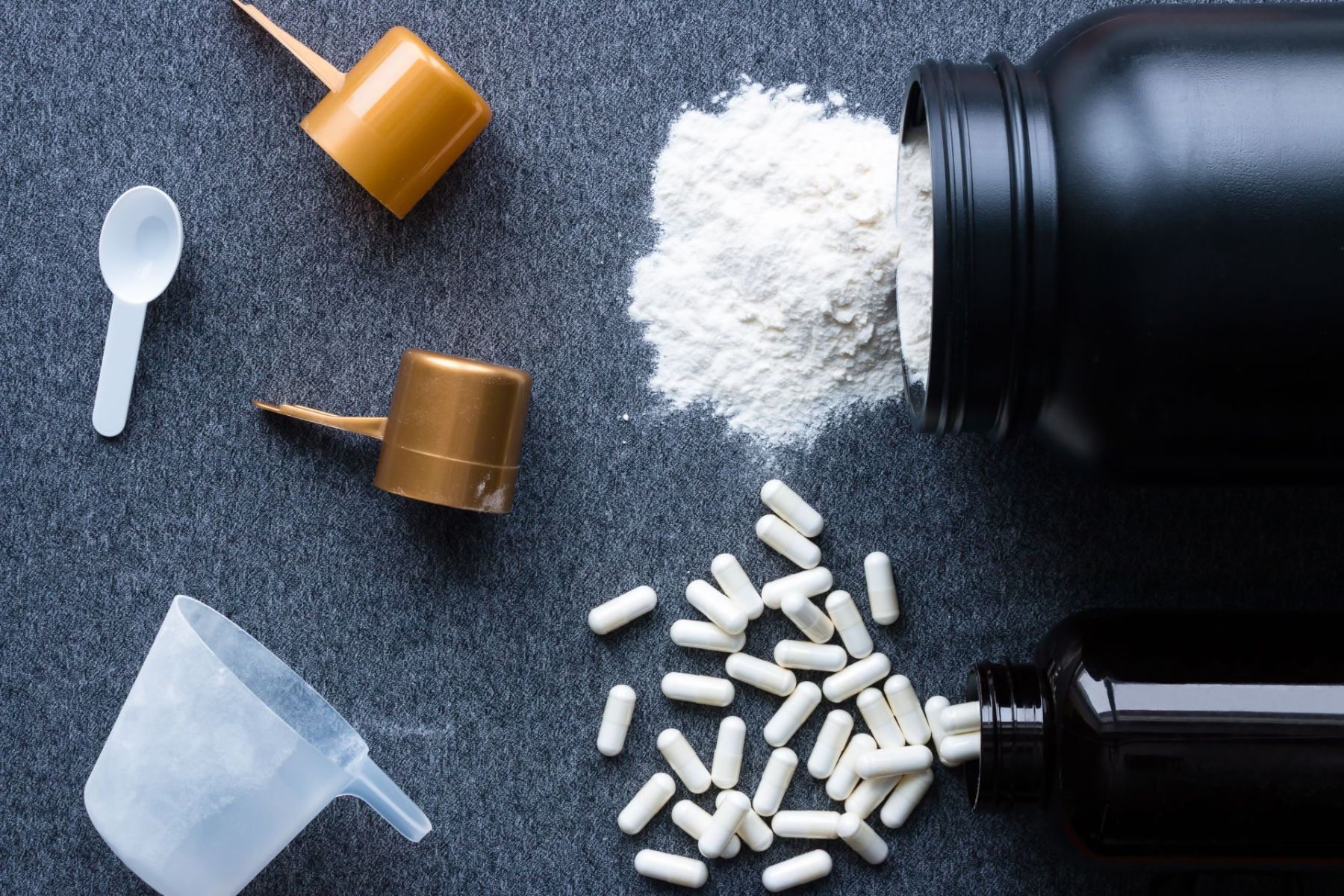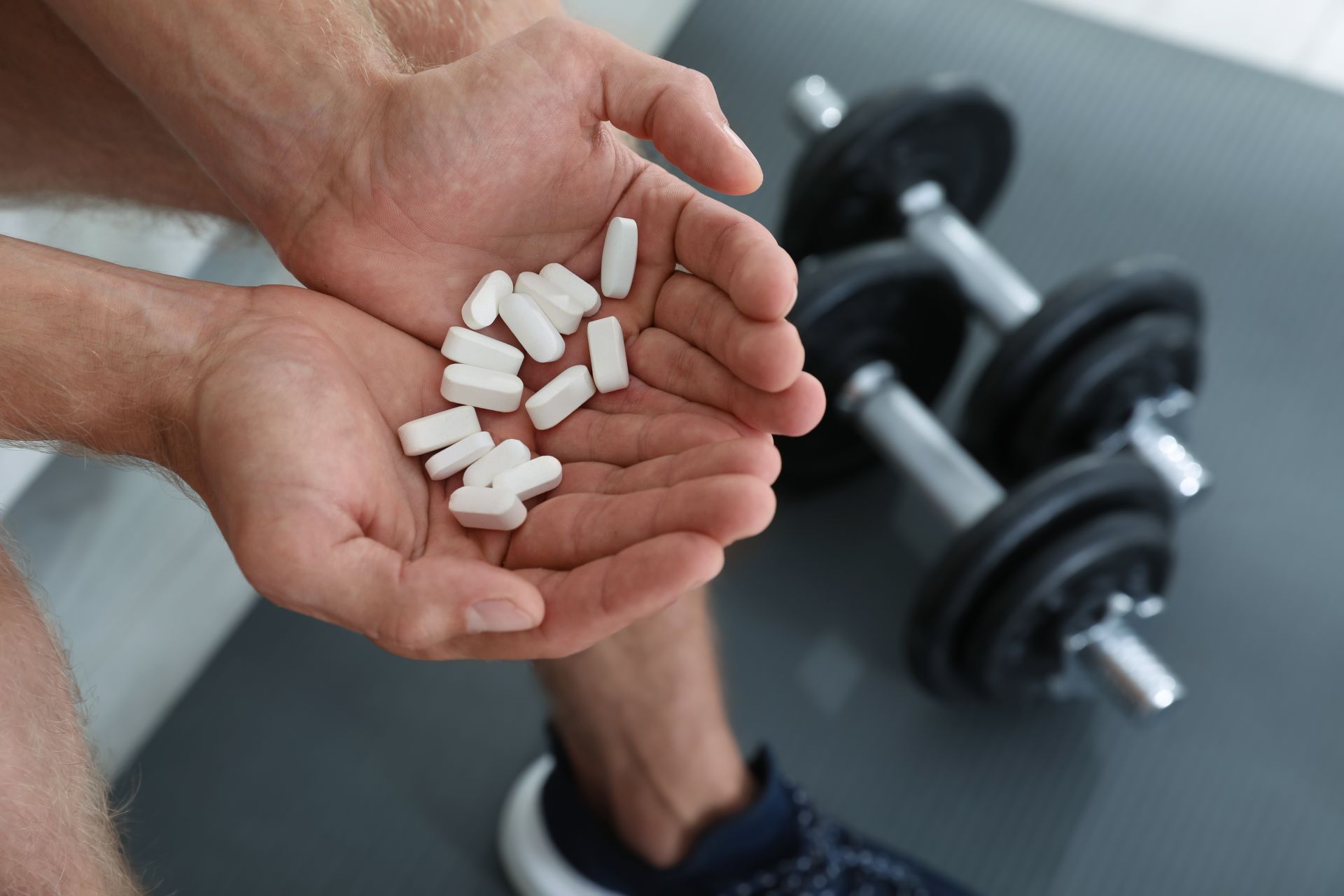Protein supplements in tablets - when to use?

Protein supplements are one of the most widely used preparations among professional and amateur athletes. They mainly come in powder form, although you can also find protein nutrients in tablets in stores. Let's find out what protein nutrients in tablets are and whether they are really worth using.
- What are protein nutrients in tablets?
- Protein nutrients in tablets - types.
- How do protein nutrients in tablets work?
- For whom are protein supplements in tablets?
- How to use protein supplements in tablets?
- Protein nutrients in tablets - is it worth taking them?
What are protein nutrients in tablets?
Protein nutrients in tablets are products that are mainly designed for people with active lifestyles. They provide moderate amounts of protein, usually 3 to 10 grams in the manufacturer's recommended daily serving of the product consumed. Protein supplements in tablets are a good source of essential amino acids (essential for the human body), including three with branched-chain amino acids (BCAAs), namely isoleucine, leucine and valine. Protein supplements in tablets, however, are not very popular among both competitive and recreational athletes. This is due to the fact that they are inefficient and very expensive compared to protein powder (such as whey protein or casein). For example, to provide about 25 grams of protein (including nearly 2 grams of leucine) from a protein nutrient tablet, you need to take 20-30 tablets at a time (depending on the protein formula), which is simply impractical and completely uneconomical.
Protein nutrients in tablets - types.
The market of nutritional and dietary supplements for athletes today offers many protein preparations, including even those that contain edible insects (such as crickets). Protein nutrients in tablets are a very narrow group of products in this category. Among the most common tablet protein nutrients found in stores are:
- Beef protein (hydrolyzate or isolate),
- Poultry protein - mainly chicken protein (hydrolysate),
- Whey protein (concentrate - WPC, isolate - WPI and hydrolysate - WPH),
- Soy protein (isolate).
How do protein nutrients in tablets work?
Protein supplements in tablets can increase muscle anabolism and have a beneficial effect on improving body composition and physical performance in people who regularly strength train. An increase in the concentration of essential amino acids in the blood after consuming a serving of a protein nutrient tablet (such as beef protein or chicken protein) contributes to increased muscle protein synthesis (MPS) and decreased muscle protein breakdown (MPB). Studies have shown that beef protein can stimulate muscle protein synthesis in both young and older people who regularly perform physical training (especially weight training). Beef protein has been shown to have similar effects on lean body mass and physical performance (especially lower limb muscle strength) as whey protein. Protein supplements in tablets that contain beef protein or chicken protein can therefore promote increased muscle mass and strength, although large daily servings of these protein preparations are then required.

For whom are protein supplements in tablets?
The main indication for additional supplementation with a protein preparation is during the period of building muscle mass, as well as fat reduction and maintenance of muscle mass, when the 24-hour demand for protein is significantly increased. Besides, providing adequate amounts of protein and essential amino acids from food as well as protein nutrients can significantly improve skeletal muscle recovery after intense exercise. Protein supplements in tablets can supplement the diet of people with active lifestyles with protein and essential amino acids. They seem to be particularly helpful for people who have been diagnosed with an allergy to cow's milk proteins and for this reason cannot consume protein nutrients based on casein and whey proteins (WPC and WPI). Protein nutrient tablets containing beef protein hydrolysate or chicken protein hydrolysate can also be safely consumed by all athletes who struggle with lactose (milk sugar) intolerance. Protein nutrients in tablets can also be used by those who, for certain reasons, prefer the form of tablets or capsules to powder.
How to use protein supplements in tablets?
According to manufacturers, protein supplements in tablets containing beef protein hydrolysate, beef blood plasma protein or chicken protein hydrolysate should be consumed in the amount of 4 to even 15 tablets per day. The recommended daily dose (number of tablets) by manufacturers of protein supplements depends on body weight and total daily protein requirements. The higher the body weight, the higher the daily dose. Protein supplements in tablets are mainly recommended for consumption after training (especially strength training) or between meals.
Protein nutrients in tablets - is it worth taking them?
Protein nutrients in tablets, unfortunately, compare very poorly with protein powder nutrients, especially when we consider the total amount of protein per serving, the concentration of essential amino acids (especially leucine), and the cost and yield per pack. As an example, below is a comparison of the average cost per packet and the protein and leucine content per recommended serving by the same leading Polish manufacturer of different types of protein supplements for physically active people.
-
Whey protein concentrate 100% WPC (1 measure - 35 g) = 27 g protein and 2960 mg leucine. The cost is £94 for a 700 g package.
-
Whey protein isolate 100% WPI (1 measure - 30 g) = 26 g protein and 2990 mg leucine. Cost of PLN 108.50 for a 600 g package.
-
Micellar casein (1 measure - 30 g) = 23 g protein and 2182 mg leucine. Cost PLN 60 for a 600 g package.
-
Soy protein isolate (1 measure - 35 g) = 30 g protein and 2400 mg leucine. Cost £46 for a 700 g package.
-
Beef protein hydrolysate (9 tablets) = 18 g protein and 558 mg leucine. Cost £113.50 for a pack of 300 tablets.
-
Chicken protein hydrolysate (6 tablets) = 8.1 g protein and 534 mg leucine. Cost of PLN 116.50 for a pack of 300 tablets.
So, as you can see, protein supplements in tablets can only supplement a meal with protein and essential amino acids (including BCAAs), and not be their main source. With this fact in mind, protein powder nutrients (e.g. WPC or WPI) will be a far better choice for all regular athletes to effectively stimulate MPS and inhibit MPB after exercise.
Sources:
-
Samal JRK, Samal IR: Protein Supplements: Pros and Cons. J Diet Suppl. 2018 May 4;15(3):365-371. https://pubmed.ncbi.nlm.nih.gov/28937838/
-
Kårlund A, Gómez-Gallego C, Turpeinen AM, et al.: Protein Supplements and Their Relation with Nutrition, Microbiota Composition and Health: Is More Protein Always Better for Sportspeople? Nutrients. 2019 Apr 12;11(4):829. https://pubmed.ncbi.nlm.nih.gov/31013719/
-
Vasconcelos QDJS, Bachur TPR, Aragão GF.: Whey protein supplementation and its potentially adverse effects on health: a systematic review. Appl Physiol Nutr Metab. 2021 Jan;46(1):27-33. https://pubmed.ncbi.nlm.nih.gov/32702243/
-
Wirth J, Hillesheim E, Brennan L.: The Role of Protein Intake and its Timing on Body Composition and Muscle Function in Healthy Adults: A Systematic Review and Meta-Analysis of Randomized Controlled Trials. J Nutr. 2020 Jun 1;150(6):1443-1460. https://pubmed.ncbi.nlm.nih.gov/32232404/
-
Hansen TT, Astrup A, Sjödin A.: Are Dietary Proteins the Key to Successful Body Weight Management? A Systematic Review and Meta-Analysis of Studies Assessing Body Weight Outcomes after Interventions with Increased Dietary Protein. Nutrients. 2021 Sep 14;13(9):3193. https://pubmed.ncbi.nlm.nih.gov/34579069/
-
Nunes EA, Colenso-Semple L, McKellar SR, et al: Systematic review and meta-analysis of protein intake to support muscle mass and function in healthy adults. J Cachexia Sarcopenia Muscle. 2022 Apr;13(2):795-810. https://pubmed.ncbi.nlm.nih.gov/35187864/
-
Sepandi M, Samadi M, Shirvani H, et al: Effect of whey protein supplementation on weight and body composition indicators: A meta-analysis of randomized clinical trials. Clin Nutr ESPEN. 2022 Aug;50:74-83. https://pubmed.ncbi.nlm.nih.gov/35871954/
-
Valenzuela PL, Mata F, Morales JS, et al: Does Beef Protein Supplementation Improve Body Composition and Exercise Performance? A Systematic Review and Meta-Analysis of Randomized Controlled Trials. Nutrients. 2019 Jun 25;11(6):1429. https://pubmed.ncbi.nlm.nih.gov/31242624/
-
Valenzuela PL, Montalvo Z, Mata F, et al: Effects of Beef Protein Supplementation in Male Elite Triathletes: A Randomized, Controlled, Double-Blind, Cross-Over Study. J Am Coll Nutr. 2021 Jan;40(1):53-60. https://pubmed.ncbi.nlm.nih.gov/32186977/
-
https://www.ais.gov.au/nutrition/supplements/group_a#isolated_protein_supplement
 ⮜ Previous article
⮜ Previous article
Cardio training - does the perfect time exist?
 Next article ⮞
Next article ⮞